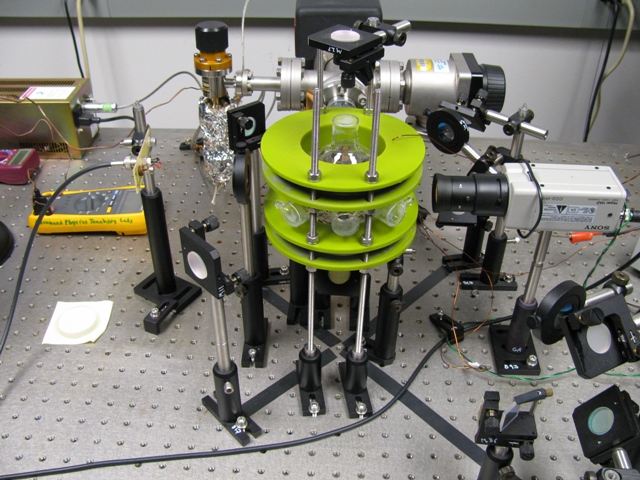Advanced Physics Laboratories
| |
| Home |
| Facilities |
| Experiments |
| Tools & Resources |
| Schedule |
| Staff |
Our advanced physics laboratories service Physics 441 and Physics 442, a required two-semester sequence of courses for students majoring in Physics at the Department of Physics at the University of Michigan, Ann Arbor Campus.
TO OUR STUDENTS
You should be prepared for a fundamental difference in difficulty and phylosophy between this course and preceding physics laboratory courses. This is a "problem solving" experience, as distinct from a "cook-book" laboratory. You may need to teach yourself how to use and calibrate many different kinds of test equipment. You may have to search for a weak signal in the presence of noise. You may have to use statistical techniques to extract results from ambiguous data sets. Your success with the experiments, and with the course, will depend on the dedication and initiative that you apply to solving whatever puzzles arise. This is simply part of the reality and joy of the experimental method.
Our Magneto-Optical Trap
Developed for our labs by Prof. Georg Raithel. The objective of the experiment is to demonstrate laser cooling and trapping of Rb-85 atoms and to analyze the trap fluorescence signal. Click the image below to view a video and hear an explanation by Prof. Raithel.
- To allow you to reproduce and understand the experimental results that are the
underpinnings of modern physics. - To provide you with an opportunity to develop critical writing skills and understand how
to effectively present your scientific work to a larger audience. - To familiarize you with experimental techniques employed in contemporary research
and industrial laboratories. - To give you a survey, via experiment, of many of the sub-fields of modern physics, and
the pertinent experimental issues in each. - To expose you to the realities of the laboratory experience, where things don't always
work, where the issues are not always clear, and where progress depends on
perseverance, ingenuity, and judgment. - To learn and appreciate the ethical and social issues that are involved in scientific
research. These include the handling of proprietary information, respect for colleagues
and adherence to high standards of honesty in reporting scientific results.
